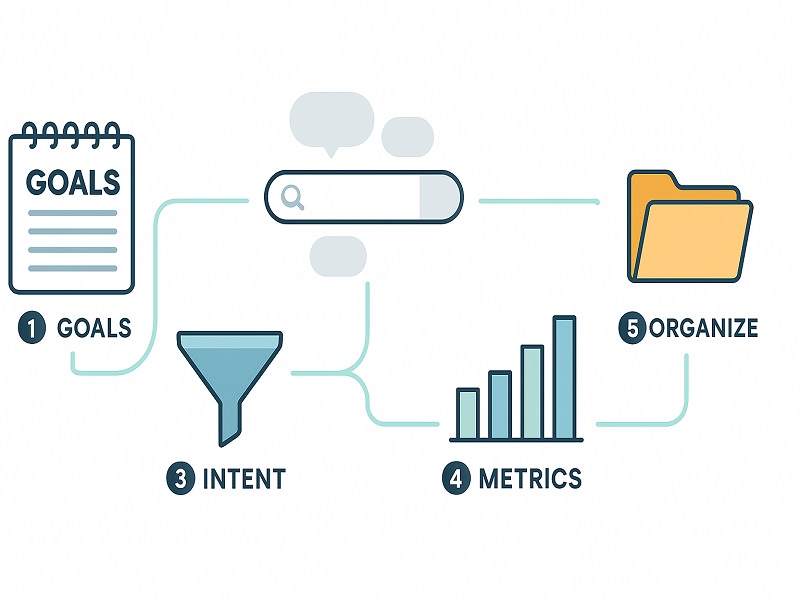Let’s be realistic. When you’re new to SEO, “keyword research” is one of those scary jargon terms gurus toss about. But when you get your hands dirty, it’s really all about knowing people – what they look for, how they think, and how you can assist them. That’s it.
In this guide, I’m going to guide you through keyword research in a manner that actually makes sense – no fluff, no jargon, and certainly no convoluted charts. Just simple, helpful tips.

What Is Keyword Research, Really?
Keyword research is determining what your perfect audience types into Google when they’re searching for answers, services, or products. These are not some arbitrary terms; these are inroads into your customer’s frame of mind.
Suppose you repair washing machines in Vizag. “Best washing machine” ranking will sound great on paper, but it will not get you customers. “Washing machine repair in Vizag” will. This is keyword research in brief: discovering terms that match what you provide and what others are actually seeking.
Step-by-Step: A Beginner’s Roadmap
Step 1: Know Your Services Inside-Out
Do not even open any keyword tool before asking yourself:
- What do I provide?
- Who do I wish to service?
- What are my customers continually asking?
If you operate a neighborhood service business, your list could include:
- AC gas refilling
- Refrigerator not cooling
- Microwave button not functioning
These aren’t issues – they’re beginnings of keyword ideas.
Step 2: Let Google Show You What People Want
You don’t have to use expensive software yet. Test these free tools:
- Google Autocomplete: Type some letters and watch what appears.
- “People Also Ask”: Gold mines of actual questions.
- Google Trends: Assist you in detecting seasonal demand.
- AnswerThePublic: Excellent for creating how/why/what questions.
If you search for “AC not working,” you may find suggestions such as:
- AC not cooling correctly
- AC repair price
- Best AC fix near me
That’s not arbitrary data – that’s what your customers are searching for today.
Step 3: Understand Search Intent (This Is Critical)
This is where most newbies go wrong. They get hold of a keyword and repeat the same immediately. But the question on everyone’s mind is: Why would someone be searching for that?
There are 3 primary search intent types:
- Informational: “Why is my fridge leaking water?”
- Transactional: “Samsung fridge repair Vizag”
- Navigational: “LG service center Vizag”
If your end goal is more bookings or calls, prioritize transactional and local intent keywords first. That’s where the money lies.
Step 4: See Whether People Are Really Looking for It
Utilize these free or freemium applications:
- Google Keyword Planner (free with Google Ads account)
- Ubersuggest (finite free searches)
- Keyword Surfer (Chrome add-on)
Prioritize:
- Search volume: Are individuals looking this up monthly?
- SEO difficulty: Is it possible for a small business website to rank realistically?
A keyword such as “Samsung AC gas refill Vizag” may have only 50 monthly searches. But if it’s a relevant and buyer-intent keyword, that’s 50 genuine opportunities.
Step 5: Group Related Keywords (a.k.a. Keyword Clusters)
Don’t deal with individual keywords all separately. Group them into groups. Here’s how:
AC Repair Cluster:
- AC repair near me
- Emergency AC repair Vizag
- AC not cooling properly
Fridge Repair Cluster:
- Refrigerator not cooling
- Samsung fridge repair Vizag
- Fridge gas refill service
You’ll write one blog post or service page for each cluster. Keep it focused. Keep it useful.
Avoid These Common Mistakes:
- Don’t chase only big-volume keywords. Relevance and intent matter more.
- Don’t just copy your competitor’s keywords. Their audience might not be yours.
- Don’t stuff keywords into your content. It doesn’t work and looks spammy.
Instead, consider the person looking. What are they seeking? How can you assist them quickly and simply?
How to Actually Utilize These Keywords:
Picking them is merely step one. Next, utilize them intelligently:
- Place your primary keyword in the title, first paragraph, and URL.
- Place related phrases in subheadings and organically throughout the content.
- Construct an FAQ area responding to frequent questions.
- Link internally to connected services or articles.
Keep in mind: one page = one topic. Avoid stuffing one page with several services or unrelated keywords.
Keyword Research Is Constant – Not One-and-Done:
Search behavior shifts. Competitors migrate. Your services evolve. That’s why keyword research isn’t a one-and-done deal.
Make it a habit to check your rankings, review new search terms in Google Search Console, and update content every few months. Even small updates can lead to big ranking jumps over time.
Final Thoughts:
If you’ve read this far, you’re already ahead of most beginners. Keyword research doesn’t need to be technical. It’s about understanding people and aligning your content to meet their needs.
Begin with their issues. Use the tools you already possess (even Google). And don’t try to rank everywhere – try to rank where it counts.
Do that, and you’ll notice SEO results that actually move the needle – not merely traffic, but targeted traffic that translates into actual business.
